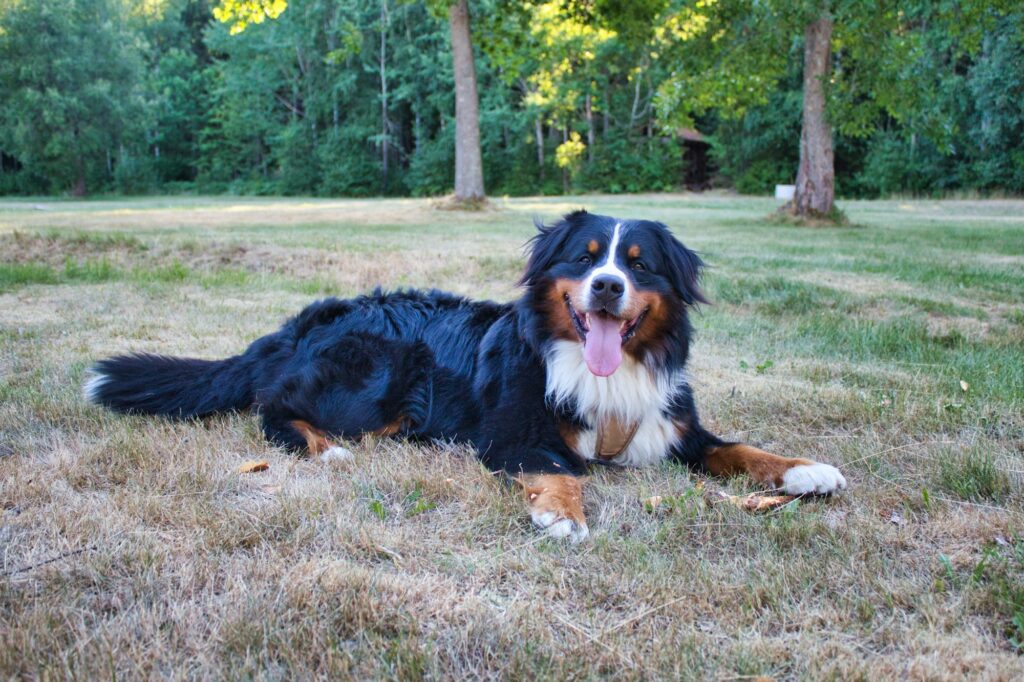Introduction to Bernese Mountain Dogs
The Bernese Mountain Dog, with its distinctive tri-colored coat and gentle demeanor, has captured the hearts of dog lovers worldwide. Originally bred as a versatile farm dog in the Swiss Alps, this breed is known for its intelligence, loyalty, and affectionate nature. As responsible pet owners, it is our duty to provide our furry companions with the best possible care, and nutrition plays a crucial role in their overall well-being.
In this comprehensive guide, we will explore the intricacies of choosing the right food for your Bernese Mountain Dog. From understanding their unique nutritional needs to navigating the vast array of dog food options available, we’ll cover every aspect to ensure your beloved companion thrives on a balanced and nourishing diet.
READ ALSO : Unleashing the Secret: Why ‘Because It’s Better’ Dog Food is the Ultimate Choice for Your Furry Friend
Understanding the nutritional needs of Bernese Mountain Dogs
Bernese Mountain Dogs are a large breed, with males typically weighing between 80 and 115 pounds and females ranging from 70 to 95 pounds. Their size and energy levels require a diet rich in high-quality proteins, complex carbohydrates, and essential fats to support their muscular development, maintain their energy levels, and promote a healthy coat and skin.
Additionally, as they age, Bernese Mountain Dogs may be prone to certain health issues, such as hip and elbow dysplasia, bloat, and cancer. Providing them with a well-balanced diet can help mitigate these risks and support their overall well-being.
Factors to consider when choosing the best food for your Bernese Mountain Dog
When selecting the best food for your Bernese Mountain Dog, several factors come into play. Here are some crucial considerations:
- Life Stage:
- Puppies have different nutritional requirements than adult dogs, so it’s essential to choose a puppy formula that supports their rapid growth and development.
- Senior dogs may benefit from a diet formulated for their specific needs, such as reduced calorie intake and enhanced joint support.
- Activity Level:
- Active or working Bernese Mountain Dogs may require a higher caloric intake and a diet rich in proteins and complex carbohydrates to fuel their energy needs.
- Less active or sedentary dogs may require a lower calorie intake to maintain a healthy weight.
- Allergies or Sensitivities:
- Some Bernese Mountain Dogs may have food allergies or sensitivities, necessitating a diet free from specific ingredients like wheat, corn, or soy.
- Health Conditions:
- Dogs with certain health issues, such as kidney disease or diabetes, may require specialized diets tailored to their specific needs.
By considering these factors, you can make an informed decision and choose a food that meets your Bernese Mountain Dog’s unique requirements.
Different types of dog food options available for Bernese Mountain Dogs
The pet food industry offers a wide range of options for dog owners, each with its own advantages and considerations. Here are some common types of dog food available for Bernese Mountain Dogs:
- Dry Kibble:
- Convenient and easy to store
- Often formulated for specific life stages and breed sizes
- Varying levels of quality and ingredient sources
- Wet/Canned Food:
- Higher moisture content, which can be beneficial for dogs with certain health conditions
- Often more palatable and appealing to picky eaters
- Generally more expensive than dry kibble
- Semi-Moist or Soft Food:
- Combines the convenience of dry food with the palatability of wet food
- May contain more preservatives and artificial ingredients
- Raw or Freeze-Dried Food:
- Mimics a more natural, ancestral diet
- Proponents claim it provides better digestion and nutrient absorption
- Requires proper handling and storage to ensure food safety
- Dehydrated or Air-Dried Food:
- Offers the benefits of raw food with a longer shelf life
- Convenient and easy to rehydrate
- Often more expensive than traditional dry kibble
Each type of food has its advantages and drawbacks, and the best choice for your Bernese Mountain Dog will depend on their individual needs, preferences, and your lifestyle.
Tips for reading dog food labels and understanding the ingredients
Navigating the world of dog food labels can be a daunting task, but understanding what you’re feeding your Bernese Mountain Dog is crucial. Here are some tips to help you decipher dog food labels and make informed decisions:
- Ingredient List:
- Ingredients are listed in order of weight, with the first few items making up the bulk of the product.
- Look for high-quality protein sources, such as real meat or meat meal, listed among the first few ingredients.
- Avoid foods with excessive amounts of fillers, by-products, or artificial preservatives.
- Guaranteed Analysis:
- This section provides the minimum percentages of crude protein, crude fat, crude fiber, and moisture in the food.
- Ensure the protein and fat levels align with your Bernese Mountain Dog’s life stage and activity level.
- AAFCO Statement:
- The Association of American Feed Control Officials (AAFCO) sets standards for pet food labeling and nutrient profiles.
- Look for the AAFCO statement, which indicates the food meets specific nutritional requirements for different life stages.
- Expiration Date and Storage Instructions:
- Check for an expiration date or “best by” date to ensure freshness.
- Follow the storage instructions to maintain the food’s quality and prevent spoilage.
By understanding dog food labels, you can make informed decisions and choose a high-quality, nutritious diet for your Bernese Mountain Dog.
Common health issues in Bernese Mountain Dogs and how diet can help

Bernese Mountain Dogs are prone to certain health issues, and a well-balanced diet can play a crucial role in mitigating these concerns. Here are some common health issues and how diet can help:
- Hip and Elbow Dysplasia:
- Maintaining a healthy weight and providing appropriate levels of glucosamine and chondroitin can support joint health and mobility.
- Omega-3 fatty acids found in fish oil or flaxseed can also help reduce inflammation and promote joint health.
- Bloat (Gastric Dilatation-Volvulus):
- Feeding multiple smaller meals throughout the day instead of one large meal can reduce the risk of bloat.
- Avoiding excessive exercise or activity immediately after mealtime is also recommended.
- Cancer:
- Antioxidants found in fruits and vegetables may help reduce the risk of certain cancers.
- Omega-3 fatty acids and lean protein sources can support a healthy immune system.
- Skin and Coat Issues:
- Providing a diet rich in essential fatty acids, such as omega-3 and omega-6, can promote a healthy skin and coat.
- Avoiding potential allergens like wheat, corn, or soy may help alleviate skin sensitivities.
By addressing these health concerns through a balanced and tailored diet, you can help support your Bernese Mountain Dog’s overall well-being and potentially mitigate the risk or severity of certain health issues.
Best food brands recommended for Bernese Mountain Dogs
When it comes to choosing the best food for your Bernese Mountain Dog, there are several reputable brands that offer high-quality, nutritious options. Here are some recommended brands to consider:
- Orijen:
- Biologically appropriate, protein-rich formulas
- Sourced from fresh, regional ingredients
- No grains, by-products, or artificial preservatives
- Acana:
- Nutrient-dense, whole-food ingredients
- Variety of formulas for different life stages and activity levels
- Grain-free and limited ingredient options available
- Taste of the Wild:
- Grain-free formulas with novel protein sources
- High in protein and essential nutrients
- Suitable for dogs with food sensitivities
- Blue Buffalo:
- Uses high-quality, natural ingredients
- Offers formulas for different life stages and breed sizes
- Includes antioxidant-rich ingredients like blueberries and cranberries
- Fromm:
- Family-owned company with a focus on quality and nutrition
- Variety of formulas, including grain-free and limited ingredient options
- Includes probiotics and prebiotics for digestive health
These brands prioritize using high-quality, natural ingredients and offer a range of formulas tailored to the specific needs of Bernese Mountain Dogs. However, it’s always a good idea to consult with your veterinarian or a canine nutritionist to determine the best option for your individual dog.
Feeding guidelines and portion control for Bernese Mountain Dogs
Proper feeding guidelines and portion control are essential for maintaining a healthy weight and preventing obesity-related issues in your Bernese Mountain Dog. Here are some general guidelines to follow:
- Calorie Requirements:
- A typical adult Bernese Mountain Dog with moderate activity levels may require between 1,500 and 2,000 calories per day.
- Puppies, senior dogs, and those with higher activity levels may require more or fewer calories.
- Feeding Schedule:
- It’s generally recommended to feed Bernese Mountain Dogs two meals per day, spaced out evenly.
- Puppies may require three or four smaller meals per day to support their rapid growth and development.
- Portion Control:
- Follow the feeding guidelines on the dog food label, but keep in mind that these are just estimates.
- Monitor your dog’s body condition and adjust portions accordingly to maintain an ideal weight.
- Use a measuring cup or scale to ensure accurate portion sizes.
- Treats and Snacks:
- Treats and snacks should make up no more than 10% of your dog’s daily calorie intake.
- Choose healthy, low-calorie treats or consider using pieces of their regular kibble as rewards.
- Water:
- Ensure your Bernese Mountain Dog has access to fresh, clean water at all times.
- Increase water intake during hot weather or after exercise to prevent dehydration.
By following these feeding guidelines and practicing portion control, you can help your Bernese Mountain Dog maintain a healthy weight and reduce the risk of obesity-related health issues.
Transitioning to a new food and troubleshooting common feeding problems

Changing your Bernese Mountain Dog’s diet can be a gradual process, as abrupt changes may lead to digestive upset or other issues. Here are some tips for successfully transitioning to a new food and troubleshooting common feeding problems:
- Transitioning to a New Food:
- Slowly introduce the new food by mixing it with the old food over a period of 5-7 days.
- Start with a small portion of the new food and gradually increase the ratio while decreasing the old food.
- This gradual transition helps your dog’s digestive system adjust to the new ingredients.
- Dealing with Picky Eaters:
- Try warming up the food slightly or adding a small amount of low-sodium broth or water to enhance the aroma and flavor.
- Rotate different protein sources or mix in a small amount of canned food to make the meal more appealing.
- Avoid giving in to begging or offering table scraps, as this can reinforce picky eating habits.
- Addressing Digestive Issues:
- If your dog experiences diarrhea or vomiting after a diet change, revert to their previous food and consult your veterinarian.
- Probiotics or digestive enzymes may help support a smooth transition and aid in digestion.
- Preventing Bloat:
- Avoid vigorous exercise or playtime immediately before or after meals.
- Feed smaller, more frequent meals instead of one large meal per day.
- Encourage your dog to eat slowly and avoid gulping down their food.
By following these guidelines and being attentive to your Bernese Mountain Dog’s feeding habits and behaviors, you can ensure a smooth transition to a new food and address any potential issues that may arise.
Homemade food options for Bernese Mountain Dogs
While commercially prepared dog foods offer convenience and balanced nutrition, some owners may prefer to explore homemade food options for their Bernese Mountain Dogs. If you choose to go this route, it’s essential to consult with a veterinary nutritionist to ensure your dog’s diet meets all their nutritional requirements. Here are some homemade food options to consider:
- Cooked Meals:
- Lean protein sources such as chicken, turkey, or lean beef
- Whole grains like brown rice, quinoa, or oats
- Vegetables like sweet potatoes, carrots, and green beans
- Healthy fats like fish oil, coconut oil, or flaxseed oil
- Raw Food Diet:
- Raw, meaty bones (under veterinary supervision)
- Organ meats like liver and heart
- Raw eggs
- Fruits and vegetables
- Dehydrated or Freeze-Dried Foods:
- Dehydrated or freeze-dried meats and organ meats
- Dehydrated fruits and vegetables
- Supplements like bone meal or kelp for essential nutrients
When preparing homemade meals, it’s crucial to follow recipes approved by a veterinary nutritionist and to ensure proper food handling and storage to prevent foodborne illnesses. Additionally, homemade diets may require supplementation to meet all nutritional requirements.
Conclusion: Providing the best nutrition for your Bernese Mountain Dog
Choosing the best food for your Bernese Mountain Dog is a vital aspect of responsible pet ownership. By understanding their unique nutritional needs, considering various factors, and exploring different food options, you can provide your furry companion with a balanced and nourishing diet that supports their overall well-being.
Remember, every Bernese Mountain Dog is an individual, and their dietary requirements may vary based on their age, activity level, and health status. Consulting with your veterinarian or a canine nutritionist can help you make informed decisions and ensure your dog receives the best possible nutrition.
Proper nutrition not only supports your Bernese Mountain Dog’s physical health but also contributes to their overall happiness and quality of life. By investing time and effort into their dietary needs, you can create a strong foundation for a long and fulfilling companionship with your beloved furry friend.If you’re looking for high-quality, nutritious food options for your Bernese Mountain Dog, visit our online store today. We offer a wide range of premium dog food brands, including those recommended in this guide. Our knowledgeable staff is always available to assist you in selecting the perfect diet for your furry companion’s unique needs. Prioritize your Bernese Mountain Dog’s health and well-being by providing them with the best nutrition possible. Visit our store now and take the first step towards a happier, healthier life for your beloved pet.


